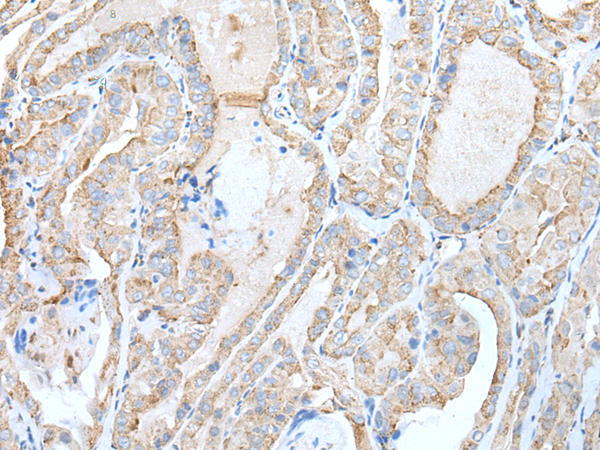
| WB | 咨询技术 | Human,Mouse,Rat |
| IF | 咨询技术 | Human,Mouse,Rat |
| IHC | 1/25-1/100 | Human,Mouse,Rat |
| ICC | 技术咨询 | Human,Mouse,Rat |
| FCM | 咨询技术 | Human,Mouse,Rat |
| Elisa | 1/5000-1/10000 | Human,Mouse,Rat |
| Aliases | MK3; HGK5; HLK3; PCN3; HPCN3; KV1.3; HUKIII |
| Host/Isotype | Rabbit IgG |
| Antibody Type | Primary antibody |
| Storage | Store at 4°C short term. Aliquot and store at -20°C long term. Avoid freeze/thaw cycles. |
| Species Reactivity | Human, Mouse, Rat |
| Immunogen | Synthetic peptide of human KCNA3 |
| Formulation | Purified antibody in PBS with 0.05% sodium azide and 50% glycerol. |
+ +
以下是关于KCNA3(Kv1.3通道)抗体的3篇参考文献,涵盖其在免疫调节和疾病中的研究:
1. **文献名称**:*Targeting effector memory T cells with a selective peptide inhibitor of Kv1.3 channels for therapy of autoimmune diseases*
**作者**:Beeton, C., et al.
**摘要**:研究通过特异性抗体或肽类抑制剂靶向Kv1.3通道(KCNA3编码),发现其可选择性抑制效应记忆T细胞活性,为多发性硬化等自身免疫病提供治疗策略。
2. **文献名称**:*Potassium channels as targets for specific immunomodulation*
**作者**:Chandy, K.G., et al.
**摘要**:综述KCNA3编码的Kv1.3通道在T细胞和巨噬细胞中的功能,探讨其抗体或抑制剂通过调节钙信号通路影响免疫反应,可能用于炎症性疾病治疗。
3. **文献名称**:*Autoantibodies to potassium channels in patients with limbic encephalitis*
**作者**:Kleopa, K.A., et al.
**摘要**:报道边缘性脑炎患者体内存在针对KCNA3等钾通道的自身抗体,提示这些抗体可能通过干扰神经元电活动导致认知障碍和癫痫发作。
4. **文献名称**:*The voltage-gated potassium channel Kv1.3 regulates energy homeostasis and body weight*
**作者**:Xu, J., et al.
**摘要**:利用KCNA3抗体阻断Kv1.3通道活性,发现其影响脂肪代谢和能量平衡,提示该通道在肥胖相关代谢疾病中的潜在作用。
以上研究涉及KCNA3抗体在免疫调控、神经疾病及代谢中的机制探索。
×